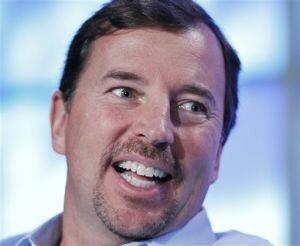Professors fear increasing ethical lapses in business
Business
Yahoo CEO caught lying about his degree as academics meet to discuss ways to teach ethics in a post-modern world

Yahoo CEO Scott Thompson was exposed as a fraud last week. The Stonehill College bachelor's degree in computer science he claimed on his resume didn't exist. In reality, Thompson doesn't have two Stonehill computer science courses to rub together.
Although Thompson's lies shocked many in the business world, studies about college student's views on cheating show at least some would have taken the same path. Thirty-three percent of undergraduates polled for a research paper from cheater-specialist and Rutgers University professor Donald McCabe confessed to having learned the contents of a test from other students before taking it. Eighty-nine percent admitted to helping friends cheat on tests. McCabe polled more than 50,000 undergraduates, enough to verify the trend, and published his findings in 2005. Since then, some professors believe the degeneration of collegiate and workplace ethics has gotten worse.
Thompson's fall from grace is just one example of the steady erosion of moral standards in the collegiate setting and, by extension, the workplace-a trend that college ethics professors are trying to reverse. But one Christian professor says they're going about it the wrong way, focusing on the results, rather than the underlying motivations for ethical lapses.
Business ethics professor Geoff Archer, who teaches at Canada's Royal Roads University, told the Pittsburgh Press his students' responses to questions about workplace motivations terrified him.
"More than half the class said 'Greed is good'," Archer said.
Archer and representatives from 32 other countries, gathered at Pittsburgh's Duquesne University earlier this month to discuss how best to teach ethics. The International Association for Education in Ethics (IAEE), a group only just established in April 2011, hosted the conference. The group's founders joined together because they realized that a global dialogue on the issue "was virtually non-existent," according to the organization's website.
The IAEE isn't the first association to spring up in response to what some professors describe as a growing emergency. The University of Montana's Online Research Ethics Course, an attempt to standardize ethics via the internet, started in 2002.
The conference didn't produce a definitive answer to the problem, but Archer plans to rely on examples of past moral lapses and their consequences, hoping to instill a moral compass by pointing out moral pitfalls. "I want them to be able to understand and describe quickly what went wrong in Enron, what went wrong on Wall Street, so that when this re-emerges in some shape or form, they'll be prepared," Archer said of his students.
Jeffery Schindel, a communications professor who teaches an ethics course at Geneva College, a Christian school in Beaver Falls, Pa., argues that Archer's approach doesn't address the true problem-the underlying worldview. "It seems that the driving ethic today is the ends justify the means," he said.
Focusing on consequences in an attempt to scare students onto the straight and narrow puts all the attention on the results. The root of the problem is a postmodern narrative that encourages personal interpretations of ethical truth, Schindel said. Unless they are Christians, who center their moral landscape on the "solid rock" of scripture, students and future executives will be willing to do whatever benefits them most.
"They don't have an ethical ground that's larger than themselves," Schindel said.
